Some 20-odd kilometres off the Pune-Mumbai road, near Baner, a fork to the left goes to Hinjewadi. Just five years ago, the landscape was lush with green fields that produced rice, jowar, bajra, sugarcane amongst other crops.
Off late, Hinjewadi has become famous as an information technology hub that houses the creme de la creme of technology companies, Indian and multinational.
Infosys, Wipro, Cognizant, Tata Technologies, Veritas Software Corporation . . . the list goes on.
While the service sector is fast replacing agriculture as the major employment provider in Hinjewadi, some patches of green still dot the concrete arena.
About three kilometres off this arena, on the same road that cuts off the Pune-Mumbai road, there is a small bungalow owned by a 40-year-old farmer, who had to fight the Maharashtra government so that he and his fellow farmers could continue to grow vegetables.
Dnyaneshwar Nivrutti Bodke is a farmer who hates subsidies and loan waivers. He also keeps off politicians and their promise of freebies.
The only time he availed of the state largesse was to repay his first ever loan.
Dnyaneshwar is a veritable rags-to-riches story made possible by the dint of his entrepreneurial zeal and liberal help from those he met on his incredible journey from being a farmer's son, to a typist, to an interior decorator, and back to where he belonged: his farms.
"It's now become a habit," says Dnyaneshwar from his office that overlooks his house and farm. He is talking about the Rs 40,000 to Rs 50,000 he -- and many other farmers who are a part of Abhinav Farmers' Club -- earn every month now from his 10-acre land.
"We earn as much as a Class I government officer earns," he beams with joy.
Things, however, were not so hunky-dory in 1972 for Dnyaneshwar, his parents and four sisters. Then they owned 15 acres of land that had adequate water supply through the year and soil that was conducive to growth.
"It was my father's apathy and inability to harvest crops scientifically," says Dnyaneshwar about the family poverty. By 1982 his father had to sell five acres of land to repay a debt of Rs 20,000 taken in 1972, which had, by then, ballooned to Rs 1,04,000 including interest.
All the extra money Dnyaneshwar's father had after repaying his debt was spent on marrying off his two daughters in the next two years. One of his sisters was married off in a rich family in Pune which turned out to be a blessing for Dnyaneshwar.

He was sent off to his sister's house where he tended cattle in the jungles and in turn secured for himself two square meals everyday.
Simultaneously, he started to learn typing. His lucky break came when an architect friend of his brother-in-law was looking out for a receptionist as the incumbent had left the job at the fag end of her pregnancy.
Dnyaneshwar immediately latched on to the opportunity. "It was much better than tending cattle in the field," he chuckles "and Rs 200 per month was a huge amount for me and my family in 1987 and the chance to reunite with my family was a huge bonus," he quickly adds.
However, there was a price to pay. Dnyaneshwar had to wake up at 6 every morning and then ride a bicycle for 75 minutes to reach his office in the heart of Pune from his home in Hinjewadi and come back home by 11 pm. The rigorous routine inculcated a sense of discipline, dedication, and courage in the young man.
"I'd often end up staying late nights watching all the draftsmen draw lines on a map, draw different diagrams and plan structures. It was only natural. I would finish my typing job in no time and then pester others to teach me what they were doing," Dnyaneshwar recalls.
S B Thorat, the owner of the firm where the 17-year-old Dnyaneshwar worked as the typist was mighty pleased with his new recruit's hunger for learning new things and asked him to learn interior decoration from Marathwada Mitra Mandal in Pune.
Dnyaneshwar jumped at the offer but was forlorn when he landed at the college the next day to enrol his name for the programme.
The two-year course cost Rs 17,000, an amount Dnyaneshwar had never seen in his life till then. His happiness knew no bounds when his mentor, S B Thorat, offered to pick up the tab.
"But I told him I'd take his offer only if he allowed me to repay his debt by paying Rs 50 from my monthly salary. My eagerness to repay my debt must have made him realise that he had bet on the right horse," Dnyaneshwar says proudly.
Two years later Dnyaneshwar passed out with flying colours -- he stood first in both the years -- and was justly rewarded with a princely salary of Rs 1,500 per month and a full time job.
For the next ten years he worked hard designing the interiors for Domino's Pizza, Venky's Fast Food, some pubs and dance bars at various locales in Pune and Mumbai.
In between, in 1996 Dnyaneshwar got married. "The only reason why my in-laws agreed to the relationship was I had a steady job," he says wistfully.
For the next two years the pressure of balancing a married life, managing a family, marrying off his remaining two sisters and keeping up with an 8 am to midnight job began to take its toll on a harried Dnyaneshwar.
He had to step aside and take a fresh look at how his life was progressing. Although, he had started earning Rs 5,000 every month by then he realised he had to quit his job and start something on his own.
The fact that his father still owned 10 acres of land had always played on his mind. Meanwhile, he had also managed to save a good amount even after repaying the Rs 70,000 he had loaned to marry his two sisters.
"Our monthly family expense would never exceed Rs 150 per month. Electricity and other miscellaneous expenditure would set us back by another Rs 100. I could still save more than Rs 4,500 every month," explains Dnyaneshwar about why he decided to quit his "high-paying job".
Earlier he had read in Pragati (Progress), a Saturday supplement that sells with Pune morninger Sakal (Morning), about a farmer from Sangli, Prakash Pawar, who in 1997-98 repaid Rs 12 lakh (Rs1.2 million) he had borrowed from a nationalised bank by pawning his 5,000 square feet farm, in just 12 months by growing carnations.
That proved to be the proverbial final nail in the coffin and Dnyaneshwar decided to quit his job and emulate the Sangli farmer. He was confident he also could replicate Prakash Pawar's feat in his village.
But there weren't many in the Bodke family who were as confident as the man himself.
"Nobody, except my mother, spoke to me for more than a week. They couldn't understand why I was quitting a high-paying job, borrowing money from a bank and making a mess of their well-settled lives," Dnyaneshwar says about the situation in his house once he told them about his decision.
The anger, however, his folks showed had a precedent. Recall the Rs 20,000 loan that Dnyaneshwar's father had taken to repay which the latter had to sell his land.
"But I knew what I was doing. They failed to see my vision. Only my mother, who worked as a farm hand during our bad days, encouraged the fire within me," says he.
But that was not the end of his problems. Dnyaneshwar knew nothing about horticulture or floriculture and absolutely nothing about growing carnations in a controlled, greenhouse environment.
But the doughty Maratha had no intentions of letting naysayers win the battle.
The two-day course at Talegaon's Horticulture Centre was inadequate for the kind of adventure Dnyaneshwar wanted to experience. Yet another gentleman, Subhash Gole, of the Horticulture Training Centre, Talegaon, bailed Dnyaneshwar out.
He recruited Dnyaneshwar as a "trainee without pay" at the centre. Money was not a concern for him at this point as he had an adequate reservoir of savings in which he could dip in to help his family survive a year without pay.
In the next 365 days Dnyaneshwar learnt all about drip irrigation, greenhouse plantation, preparing a risk bed, basal dose, preventing carnation plantations from attacks from Mites and Thrips and learnt about various sprays and pesticides that helps in good growth of carnations.
Now that he knew all about carnations and how to grow them in a controlled environment, the next hurdle was convincing a bank to give him a loan of Rs 500,000 so that he could give shape to his dreams.
Dnyaneshwar, in 1999, was an unknown entity in his village. The only assets he had were his 10-acre land, his knowledge of growing carnations and a master plan that he had been preparing forever since he started working as a without pay trainee.
"I had known for a fact that the demand for carnation flowers had been growing at a steady 20 per cent since 1995 and had a ready market in India as well as in Europe," says Dyaneshwar.
"I had meticulously planned every detail of how I would be spending a Rs 5 lakh loan and not only repay it within two years but also make a decent return on it. The bank manager was impressed when I pitched for the loan at the Deccan branch of Canara Bank in Pune. In two months my loan was sanctioned," reveals Dnyaneshwar.
Almost 14 months from the day he got his cheque from Canara Bank, Dnyaneshwar knocked on their doors again. This time he was there to repay his dues, interest included.
"I earned Rs 4,88,000 after selling my produce and got a subsidy of Rs 1,22,000 from National Horticulture Board for my efforts and actually made a small profit after repaying the principal and interest," says Dnyaneshwar of his marvellous achievement.
But the doughty farmer that Dnyaneshwar is would not stop at that. He believes that farmers must bring in a bit of commercialisation into their farming practices.
"They should learn to realise that farming is a business. I want every farmer to become a businessman," he says. But this is not mere preaching. He practices what he preaches.
After successfully experimenting with his model of farming, Dnyaneshwar went about organising farmers in Hinjewadi and organised them into Abhinav Farmers' Club. The plan was to come together, pool in money and standardise farming, buying of seeds, fertilizers and use it as a bargaining chip to reduce costs and realise economies of scale.
As it happens with all good things, in the third year of its existence Dnyaneshwar's brainchild had just 7 farmers.
"People wanted to sell their land to the IT parks," he says ruefully even as he says he failed to convince those who sold about their grave mistake.
"Freebies spoil farmers," says he, pointing to the fact that subsidies and loan waivers offered to farmers is not a long-term solution to the woes of Indian farmers.
"Those who sold their land for IT parks are now working as security guards in those very companies," he points out.
Reason? "Money that came easy was spent on wine and women in no time and without land under their belt they have nowhere else to go," says Dnyaneshwar, who always believed his Abhinav Farmers' Club would one day become a hit.
"Not because I was saying so but because I was convinced that other farmers would one day see the benefits of negotiating unanimously and bringing down their input costs and maximise profits. Profits are the only reason why farmers would join us and more farmers are witnessing
Interestingly, 173 farmers have become a part of this revolution today. The number is expected to hit 200 as financial year 2010-11 will come to a close on March 31 next year.
Just for the record these 173 farmers, with combined land acreage of 27 acres produced agricultural output of Rs 15.5 crore (Rs 155 million) for the year ending 2009.
"For the year ending 2010-11 we expect our turnover to reach Rs 20 crore (Rs 200 million)," declares the founder of Abhinav Farmers' Club very proudly.
Today this co-operative movement produces 1.75 tonne of crops and vegetables -- carnations, broccoli, celery, parsley, leek, iceberg, red roman, brussels sprout, basil, zucchini, coloured capsicum, sweet and baby corn, and cherry tomatoes -- that are then sold as salads and toppings on nutritious pizzas in Pune city and the very IT parks that gobbled the lush greens that once made up the farming village of Hinjewadi.
Meanwhile, Dnyaneshwar trains 30 farmers every Saturday who come to his office from all over Maharashtra and from states as far as Arunachal Pradesh, Uttarakhand, Delhi, Gujarat and Orissa, to name a few.
All his lectures begin with: 'Subsidies are the farmers' biggest enemies'; 'loan-waivers only help the kith and kin of politicians'; and 'money borrowed with the intent to repay leads to wealth and well-being'.
173 farmers of Hinjewadi -- who earn anywhere between Rs 40,000 and Rs 50,000 every month -- and their friends and families are witness to it.
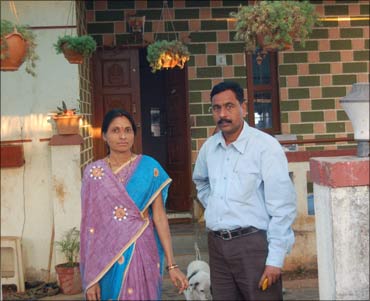

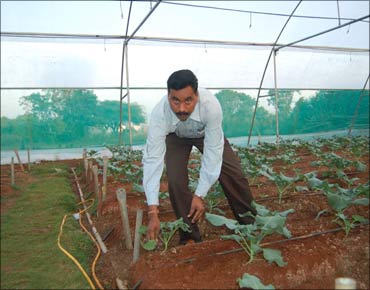

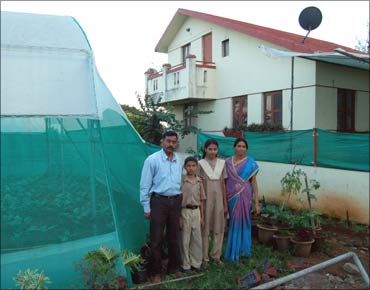
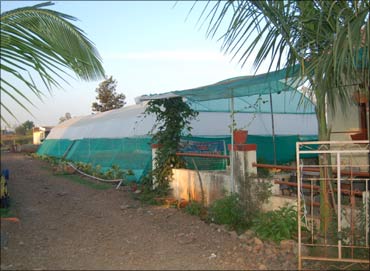


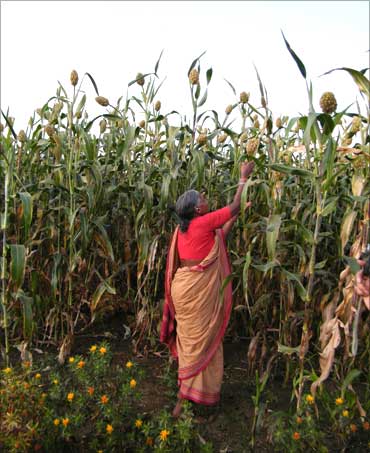

ReplyDelete=======================================
45a11b298Here are best materials for you!
John Smith Mar 23, 2018 at 8:36 PM
LEARN HOW TO BECOME MILLIONAIRE ONLINE
This is one of best online course about how to become millionaire online.
It is difficult to become a millionaire, so perhaps this course is only rated 4.4*.
Source: How to become millionaire online in one year
Jennifer Lee Mar 21, 2018 at 7:36 PM
LEARN FREE HOW TO MAKE MONEY ONLINE BY AFFILIATE MARKETING
This is a free course by Affilorama, the leading internet marketing academy, rated 4.7 * by 87k+ students.
source: Free training affiliate marketing online
Juan Carlos Mar 27, 2018 at 8:36 PM
12 SECRETS TO GET ANY GIRL TO LIKE YOU
This is one of top secrets that help you get any girl to like you.
Rated 4.7* by 5600+ students.
Link: 12 secrets to get any girl to like you
Mike Jones Mar 29, 2018 at 9:36 PM
LEARN FREE PIANO ONLINE:
This course is organized by LearnPianoIn30Days. This site offer 14 days free training for only $1.
More details: $1 Trial to learn piano in 14 days
David Smith April 1, 2018 at 10:36 PM
13 SECRETS TO CAPTIVATE ANY MAN:
This is one of top secrets that help you get any girl to like you.
Rated 4.7* by 5600+ students.
Link: 13 secrets to captivate any man
Emma Emily April 2, 2018 at 10:36 PM
LEARN FREE GUITAR ONLINE:
This course is organized by Play Worship Guitar. This site offer 21 days free training for only $1.
More details: Trial 1$ learn guitar online in 21 days
Peter Ho April 3, 2018 at 14:36 PM
12 SECRETS TO BECOME FAMOUS MAGICIAN?
This is best course online about how to become a magician!
This training course offer free trial and 60 days money back guarantee
Link: Trial to Learn Mentalism Effects and Magic Tricks
Jennifer Tran April 3, 2018 at 19:36 PM
HOW TO LOSE 1 POUND OF BELLY FAT EVERY 72 HOURS?
yes it can. Bruce Krahn and Dr. Heinrick created this program specifically for men and woman.
The core of the program is a formula by Heinrick that is supposed to work well against belly fat and its associated health issues
Here are link: Link: Secrets to lose 1 pound of belly fat every 72 hours
Brittany Jones April 3, 2018 at 19:36 PM
HOW TO SELF-DEFENSE WITHOUT ANY MARTIAL ARTS TRAINING?
yes it can. Real self-defense system, designed By Swat Team Leader, even without any martial arts training.
Here are link: Link: 8 secrets for self-defense without any martial arts training
Penny Albritton April 3, 2018 at 19:36 PM
GET YOUR SEXIESTBODY EVER BY YOGA?
Here are link: Link: 9 secrets to get your sexiest body ever by yoga